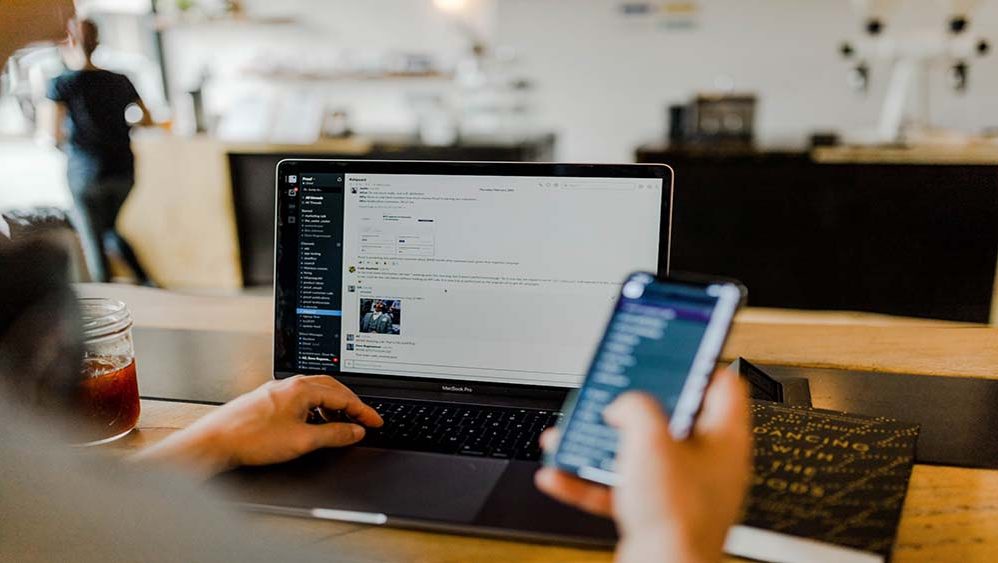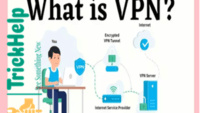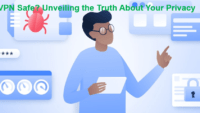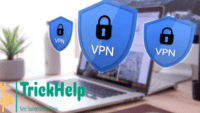A VPN, or Virtual Private Network, is used to secure internet connections and protect online privacy. It enables users to send and receive data across public networks as if their computing devices were directly connected to a private network.
Exploring the digital world securely is a priority for both individuals and businesses. A VPN serves as a powerful tool to achieve this, providing an encrypted tunnel for data traffic, which keeps online activities confidential. This security measure is vital for safeguarding sensitive information from cyber threats and for maintaining anonymity online.
Businesses utilize VPNs to ensure secure remote access for their employees, safeguarding internal communications from potential eavesdroppers. For personal use, VPNs help in bypassing geographic restrictions on websites or streaming services, granting users the freedom to access content globally. With concerns about digital privacy and cyber security on the rise, employing a VPN is becoming increasingly common as a simple yet effective measure to enhance online safety and freedom.
The Purpose Of Utilizing VPNs
In the digital age, where cybersecurity threats loom and privacy concerns are at an all-time high, Virtual Private Networks (VPNs) play a pivotal role in safeguarding online activities. VPNs serve multiple purposes, from enhancing private browsing experiences to accessing content beyond geographical bounds and bypassing internet censorship. These secure tunnels between your device and the internet not only boost privacy but also extend the diversity of online content available to users. Delving into the core purposes of VPNs, let us unpack their critical roles in the contemporary digital landscape.
Enhances Private Browsing
Privacy is a commodity that bears high value in the online spectrum. Utilizing a VPN enshrouds your online footprint, curtailing the likelihood of your data being tracked or harvested by third parties. A VPN masks your IP address, encrypting data transfer, and keeps your browsing hidden from prying eyes, whether they be cybercriminals, ISPs, or advertisers hungry for your digital habits.
Accessing Geo-restricted Content
The internet is a treasure trove of information and entertainment that unfortunately isn’t equally accessible to everyone. Geographical restrictions can lock away content based on your location, but a VPN can help circumvent such barriers. By connecting to servers in different countries, you can explore international media, stream shows, and access websites that are typically beyond your reach, enriching your digital experience with global diversity.
Bypassing Censorship
Governments and institutions often impose restrictions on internet usage to control the flow of information. This digital censorship can be a massive hurdle for the free exchange of ideas and information. VPNs offer a robust solution, enabling users to connect to servers beyond their restrictive jurisdictions. By doing so, individuals can freely access a full spectrum of viewpoints, social media platforms, news outlets, and other resources, championing the right to information and freedom of speech.
VPN and Online Security Enhancement
Virtual Private Networks (VPNs) serve as a critical layer of security in the modern digital world. By creating a private network from a public internet connection, VPNs mask your internet protocol (IP) address, making your online actions virtually untraceable. Beyond privacy, a fundamental aspect of VPNs is enhancing online security. Let’s delve into how VPNs contribute to safeguarding your digital presence.
Encrypting Data For Secure Transmission
A primary feature of a VPN is the encryption of data that travels across the internet. This encryption converts information into a code to prevent unauthorized access, ensuring that sensitive data such as passwords, emails, and credit card details are shielded during transmission. Here’s how data encryption elevates security:
- End-to-end encryption: All data is securely encrypted from the moment it leaves your device until it reaches its destination.
- Advanced security protocols: VPNs use robust protocols like OpenVPN and IKEv2 to provide high levels of security.
- No eavesdropping: Encrypted data means that even if intercepted, the information is indecipherable to outsiders.
Shielding From Hackers And Snoopers
VPNs serve as a formidable barrier against hackers and snoopers who thrive on exploiting vulnerable connections to steal information. Here’s how VPNs provide this layer of protection:
- Anonymity: By masking your IP address, VPNs make it difficult for attackers to target your device specifically.
- Secure connections: VPNs ensure that all data is passed through secure, encrypted tunnels, thwarting many common cyberattack methods.
Protection on Public Wi-fi Networks
Public Wi-Fi networks, often found in places like cafes and airports, are infamous for their lack of security. Using a VPN on these networks is crucial as it protects your online activities from prying eyes. These are the advantages of using a VPN on public Wi-Fi:
| Benefit | Description |
|---|---|
| Wi-Fi Security | VPNs encrypt your traffic, making it secure even on open, unsecured networks. |
| Data Integrity | VPNs prevent attackers from tampering with your transmitted data. |
| Privacy Assurance | Secure VPN tunnels ensure that your browsing history and personal information remain private. |
What Purpose Use Vpn For Streaming
Imagine a world where geographical boundaries don’t limit the entertainment you can enjoy. VPNs (Virtual Private Networks) offer just that possibility, providing a passport to a vast universe of streaming possibilities. What Purpose Use VPN for Streaming reveals how a VPN can transform your online streaming experience, unlocking content from around the globe, maintaining high-speed quality, and granting you access to an expanded array of shows and movies. Let’s dive into how these digital tools can enhance your streaming sessions.
Unblocking Streaming Services Worldwide
When it comes to streaming, a VPN is like a key to the world’s virtual library. Not all content is available in every region due to licensing restrictions. A VPN can hide your actual IP address and replace it with one from a different country, making it appear as though you’re browsing from there.
- Netflix: Connect to a US server for a vast selection of movies and shows or switch to the UK for regional favorites.
- Hulu: Usually restricted to the US, with a VPN, enjoy its offerings anywhere.
- BBC iPlayer: Despite being UK-exclusive, a VPN opens its doors to viewers worldwide.
Improving Streaming Speeds By Avoiding Throttling
ISP throttling can be a major buzzkill, especially during peak hours when you’re trying to relax with a high-definition stream. Your Internet Service Provider might slow down your speed when it detects heavy data usage, which is often the case with streaming. By using a VPN, your online activities become encrypted and less visible to your ISP, which helps prevent intentional slowdowns and maintains a consistent, high-quality streaming experience.
Accessing A Wider Variety Of Content Libraries
Each country has its own unique streaming library, and without a VPN, you’re stuck with the offerings in your current location. A VPN for streaming purposes not only opens the gates to global entertainment but also lets you explore exclusive genres and titles that may never be available in your home country. Japanese anime, Korean dramas, European cinema—the world’s content becomes your oyster.
| Service | Without VPN | With VPN |
|---|---|---|
| Netflix | Limited to one country’s library | Access to multiple countries’ libraries |
| Amazon Prime | Selection varies by region | More shows and movies from different regions |
| Disney+ | Country-specific content | Expanded access, including titles not released in your country |
Ensuring Anonymity With VPN Use
When it comes to digital privacy, virtual private networks (VPNs) serve as your discreet guardians. They do more than just open the doors to a world of unrestricted internet; they cloak your online existence in a veil of anonymity. Below we’ll uncover how a VPN achieves this and why it might just be the digital ally you’ve been seeking to maintain anonymity online.
Concealing Ip Addresses And Locations
Your IP address is like your home address for the internet; it tells servers where to send the information you request. VPNs mask this address, effectively hiding your physical location and preventing anyone from pinpointing your real-world location. By connecting to a VPN server, you assume the server’s IP address as your own—creating a powerful first line of defense against prying eyes.
Here’s what a VPN does for your IP:
- Encrypted connection: Forms a secure tunnel between you and the internet.
- New IP address: Assigns a different IP every time you connect, making it hard to trace.
Preventing Tracking By Isps And Websites
Your Internet Service Provider (ISP) has the potential to track every website you visit, and in some cases, this data can even be sold to advertisers or handed over to authorities. VPNs prevent your ISP from snooping on your online life by encrypting your data, rendering it unreadable to any outsiders. Additionally, websites you visit will only see the VPN server’s IP, not your personal one. This means:
- Your browsing habits remain private.
- Reduced targeted advertising.
- No direct link between your digital activities and your identity.
Safeguarding Against Digital Footprints
Every time you click, download, or sign up, you leave a digital footprint—a trail revealing your online activity. A VPN serves as a digital broom, sweeping away your tracks, making it difficult for third parties to reconstruct your online journey. Here’s how:
| Action | Without VPN | With VPN |
|---|---|---|
| Web Browsing | Exposed and traceable activity. | Anonymous and private browsing. |
| Downloads | Associatable to your IP address. | Disconnected from your identity. |
| Online Transactions | Potentially traceable financial activity. | Secured and masked monetary movements. |
A VPN is your steadfast ally against unwanted online tracking, pervasive advertising, and invasive data collection, ensuring your digital presence remains both secretive and secure.
VPNs Empowering Remote Work
In the modern digital age, VPNs have become the backbone of remote work, offering a secure bridge between remote employees and their office’s network. With more businesses adopting flexible work arrangements, the importance of VPNs has skyrocketed, ensuring that productivity doesn’t have to be limited by location. Below, we explore the pivotal roles VPNs play in empowering remote workers by enhancing security, simplifying file sharing, and providing seamless access to essential resources.
Secure Connections To Work Networks
A VPN (Virtual Private Network) establishes a protected network connection when using public networks. This encrypted tunnel is critical for remote workers who access sensitive information from various locations. By routing data through secure servers, VPNs cloak user activity, making it virtually impossible for unauthorized entities to intercept confidential information.
- Data Encryption: All data transmitted over a VPN is encrypted, providing a shield against data breaches.
- Privacy Assurance: VPNs mask IP addresses so that remote workers can conduct work activities without compromising their privacy.
- Consistent Security Policies: With a VPN, businesses enforce the same security measures for remote employees as they do in the office.
Facilitating Safe File Sharing
Collaboration is the heart of business efficiency, and with VPNs, sharing files across distances is both safe and straightforward. Security protocols within VPNs ensure that information remains confidential during transfers, critical for preserving the integrity and privacy of business data.
- Utilize secure file-sharing platforms integrated with VPN services.
- Adopt end-to-end encryption for all shared documents.
- Implement access controls to restrict file-sharing based on user roles and permissions.
Enabling Remote Access To Resources
VPNs provide remote workers with uninterrupted access to office networks, enabling them to utilize resources as if they were physically on-site. This capability is vital for maintaining continuous workflows and accessing applications and databases housed within the company’s local network.
| VPN Feature | Remote Work Advantage |
|---|---|
| Network Accessibility | Connect to company networks from any global location. |
| Resource Availability | Access files, applications, and systems essential for daily tasks. |
| Bandwidth Allocation | Optimize connection speeds for workload demands. |
By implementing a robust VPN solution, businesses empower their employees to securely leverage the full spectrum of work-related resources from any corner of the globe. The combination of secure connection establishment, safe file sharing practices, and remote resource accessibility ensures that teams remain productive, collaborative, and efficient, regardless of physical boundaries.
Frequently Asked Questions On What Purpose Use Vpn
Why Should I Use A VPN?
A VPN enhances online privacy by masking your IP address. It encrypts data transfers, securing your browsing activity from prying eyes.
What Are The Benefits Of Using VPN?
VPNs provide secure connections, safeguard against cyber threats, and allow access to geo-restricted content. They also prevent ISP tracking and bypass censorship.
Can VPNs Improve Internet Speed?
In some cases, VPNs can bypass ISP throttling, potentially improving internet speeds for certain activities. However, encryption can also occasionally slow down the connection.
Is Using A VPN Legal?
Using a VPN is generally legal in most countries. However, it’s essential to ensure compliance with the laws and regulations of your country when using a VPN service.
Conclusion
Understanding VPN use is crucial for anyone navigating the digital landscape. It enhances security, preserves privacy, and ensures online freedom. Whether for personal safeguarding or corporate data protection, VPNs offer a versatile solution. Opt for a reputable provider to maximize these benefits, and consider making VPNs a staple in your online routine.






Pingback: List Top VPN Services Also Short Summary: Secure Choices | TrickHelp